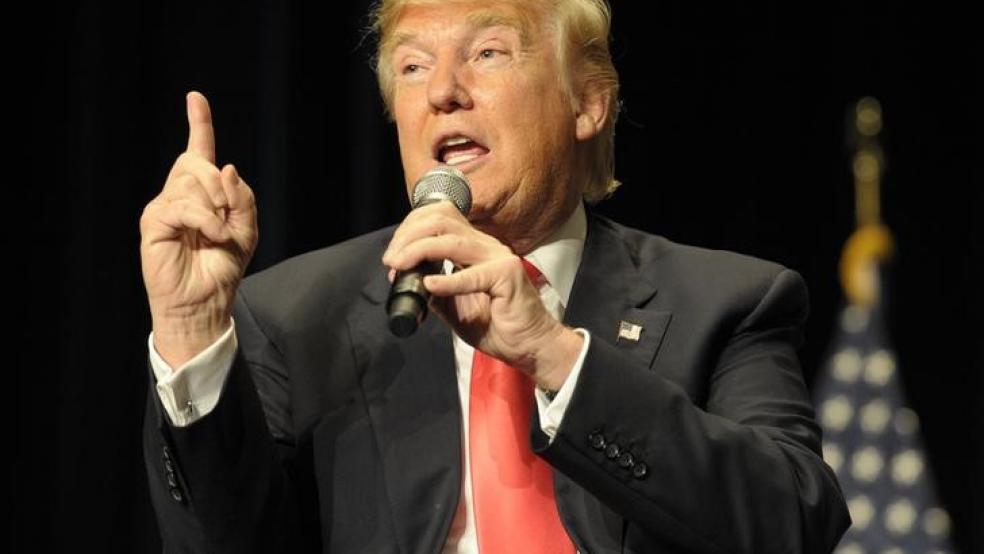The pledge that Republican candidates signed early in the presidential primary season, promising to support the eventual nominee if they lose, looks increasingly likes a suicide pact.
The three remaining candidates for the Republican presidential nomination who are not named Donald Trump have inched up to the line suggesting that the mercurial billionaire is so wildly unsuited to be president that they would not support him in a general election.
But so far, none has been willing to step over. Instead, Texas Sen. Ted Cruz, Florida Sen. Marco Rubio and Ohio Gov. John Kasich have all condemned Trump’s inflammatory rhetoric and the violence on display at his rallies. They’ve called on Trump to dial back his language and said that his call for supporters to pledge allegiance to him with a gesture reminiscent of the Nazi salute is “troubling.”
Related: As Outrage Turns to Violence, Trump Won’t Moderate His Message
But over the weekend, even as stories of violence between protesters and Trump supporters were everywhere, even as Trump said he was considering paying the legal costs of a supporter who assaulted a protester, all three stuck to their pledge – reiterated in the most recent GOP debate last week – that they would reluctantly support the billionaire against whomever the Democrats nominate.
Cruz, speaking to reporters on Monday, reiterated that he would support Trump in the general election, though he qualified it by saying, “I can give you one example where I would no longer support Donald Trump. If for example, he were to go out on 5th Avenue and shoot somebody, I would not be willing to support Donald Trump.”
Cruz was referring to Trump’s own boast that he could kill someone in broad daylight and suffer no consequences among his supporters. But it tacitly admits that the race baiting and demagoguery on display at Trump rallies is not, in Cruz’s opinion, a disqualification for the presidency.
Rubio, over the weekend, delivered a lengthy takedown of Trump and his campaign, but concluded, “I still, at this moment, continue to intend to support the Republican nominee,” he said. “But it's getting harder every day.”
Kasich, likewise, condemned Trump’s rhetoric. “There is no place for a national leader to prey on the fears of people who live in our great country,” he said. He accused Trump of creating “a toxic environment that has allowed his supporters and those who sometimes seek confrontation to come together in violence.”
Related: Worried About Trump’s Appeal, Big Labor Gears Up for a Fight
But, asked if he would support Trump nonetheless, he mustered only, “It makes it extremely difficult.”
The irony here is that the pledge was originally meant to handcuff Trump, because the party was concerned about him bolting and taking his followers with him. Now, it’s forcing Cruz, Rubio, and Kasich to pre-emptively endorse the potential candidacy of a man who is demonstrably fomenting violence and condoning biogtry, even as he claims to want peace and inclusion.
They are doing it in part because publicly pledging not to support Trump would play into his narrative of persecution by the GOP establishment, and would eat into the support any of his rivals might hope to get from Trump voters in a general election.
But even before they got to a general election, they would have to deal with Trump’s attacks on them as betrayers.
Related: Trump Moves to Take Control of the Republican Party
The Trump attack ads basically write themselves. Any candidate who says that he would refuse to support Donald Trump in the general election would be painted as not only a hypocrite who broke his pledge, but as fundamentally disloyal to the Republican Party. (And if you think for a minute that Trump wouldn’t use that line of attack even though he has repeatedly threatened to break the pledge himself, well, you haven’t been paying attention.)
Of course, the Democratic attack ads for the general election write themselves, too. All three of the remaining candidates have stuck around, presumably, because they feel they still have a chance to be the eventual nominee. But there are, no doubt, already Democratic consultants preparing advertisements along the lines of, “Even as Trump was publicly endorsed by a former leader of the KKK, Candidate X said he would support him as the Republican nominee.”
At this point, even a full-throated repudiation of Trump combined with a pledge not to support him in the general election would be too late to spare a non-Trump candidate those advertisements. The wording would just be adjusted to demonstrate how late they were in fully denouncing him.





